Europe
What the North Koreans took into battle against Ukraine
The Washington Post January 19, 2025
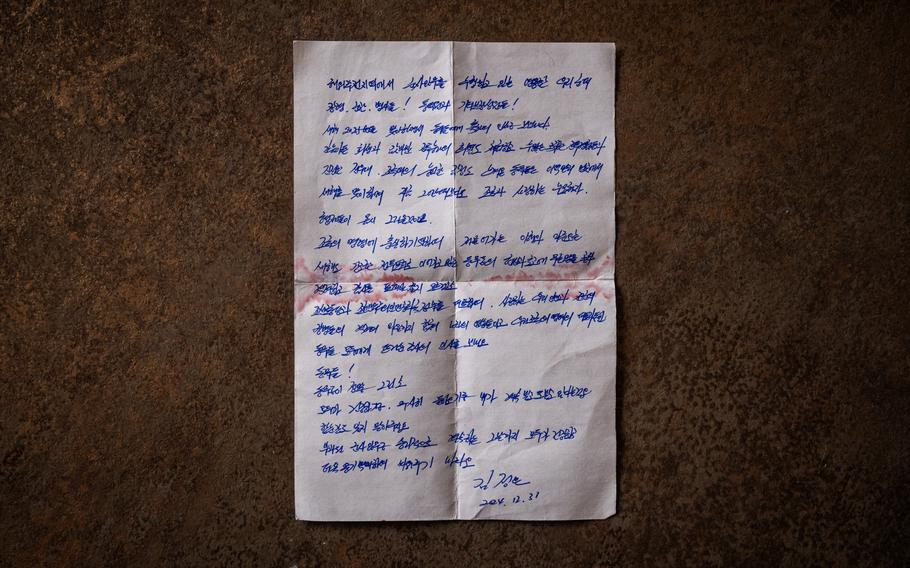
A handwritten letter with a message from North Korean leader Kim Jong Un, found on a North Korean soldier in Russia’s Kursk region and photographed on Jan. 14, 2025, in the Sumy region of Ukraine. (Ed Ram for The Washington Post)
SUMY REGION, Ukraine — “Resistance is futile.” “Surrender.” “You’re all surrounded.”
The phrases, printed in Korean with rough Russian transliterations on a weathered piece of paper Ukrainian troops said they took off a dead North Korean soldier this month, offer a remarkable insight into how Russia appears to have prepared their new allies to take Ukrainian prisoners during their assaults on the front lines.
Ukrainian troops are using such documents and other items they have recovered from the battlefield to better understand the thousands of North Korean troops that have been assaulting their positions in recent weeks, in the latest global escalation in the war between Russia and Ukraine.
The items and Ukrainian soldiers’ accounts of encounters with North Korean forces paint a picture of the secretive North Korean troops — whose existence has not been confirmed by Russia or North Korea — as highly motivated, organized, well-trained and better equipped than Russian infantry, even as they suffer heavy casualties.
Ukraine appears increasingly eager to gather evidence of North Korea’s growing role in the war as President-elect Donald Trump prepares to take office on Jan. 20. Trump, who met several times with North Korean leader Kim Jong Un during his last presidential term, has pledged to end the conflict.
The retrieved items are especially important because of how hard it has been for Ukrainian troops to capture and question North Koreans in the course of the fighting. Unlike many Russian troops, who Ukrainian soldiers say will often surrender willingly, the North Koreans have fought until their deaths or killed themselves with grenades to evade capture.
Ukrainian special forces troops showed Washington Post reporters the list of 23 Korean and Russian phrases, along with handwritten New Year’s letters attributed to Kim, as well as body armor, equipment, first aid kits, military IDs, a shovel, a Ukrainian-made knife and two modern Russian assault rifles retrieved in recent weeks from dead North Korean troops.
Vlad, 31, a member of the 1st Battalion of Ukraine’s 8th Special Operations Forces Regiment, the unit that showed the gear and documents to The Post, said Russia appears to have followed a “best for the guest” mentality when preparing their allies for battle.
“The Russians were much more poorly equipped,” he said. “The Russians tried to show off for the North Koreans.” Like other Ukrainian soldiers quoted in this article, he spoke on the condition that only his first name be used, in keeping with Ukrainian military rules.
Ukraine President Volodymyr Zelenskyy said this month that as many as 4,000 North Korean troops have been killed or wounded in recent weeks, with only two captured alive. Both men were wounded and transferred to custody in Kyiv, where Zelenskyy said they are being interrogated and treated for their injuries.
North Korean attacks have thus far been contained to the small enclave in the western Russian region of Kursk that Ukrainian troops have controlled since August last year. In recent days, after weeks of relentless assaults, North Korean troops have hardly appeared on the battlefield, Ukrainian troops say, even as Russian assaults continue.
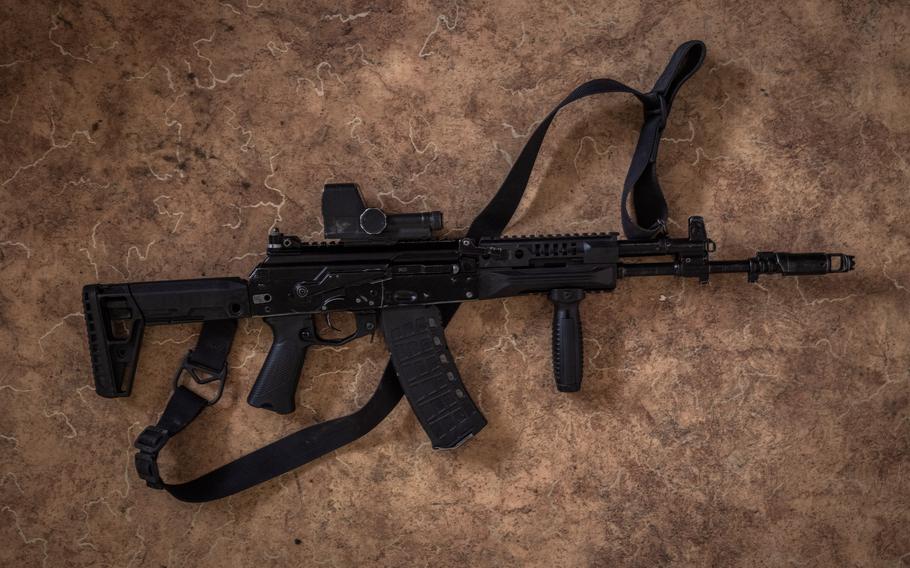
A Russian AK-12 rifle found on a North Korean soldier in Russia’s Kursk region. (Ed Ram for The Washington Post)
Their sudden absence could signal they are regrouping and assessing future moves, or could be a reflection of widespread injuries and exhaustion after recent attacks.
“They are licking their wounds,” said Vitalii, 25, another soldier in the special forces battalion who spent eight hours locked in a firefight with North Korean troops last month.
The two handwritten pages relaying messages from North Korean leader Kim Jong Un were dated from Dec. 31 and Jan. 1. The documents were independently translated by The Post.
The origins of the letters, which shared New Year wishes and thanked the troops for fighting on behalf of their motherland, were not clear. They may have been sent to the troops from Pyongyang or written down by North Korean soldiers who listened to their commanders read the messages from Kim out loud.
“You experienced heartbreaking sacrifices and the joys of costly battle victories, many noble combat experiences, the priceless feeling of genuine camaraderie and patriotism, all so far away from the motherland,” one of the messages read. “I don’t even know how I can find the words to properly encourage and express gratitude for your dedication and tireless efforts.”
“I really miss you comrades,” the letter read.
A separate small booklet found on a soldier last week was filled with handwritten lyrics to patriotic North Korean songs. “My fate is always shared with the motherland,” one of the lyrics read.
That the soldiers carried those messages in their pockets while on missions suggested to the Ukrainian troops that they are significantly more ideologically motivated than Russian soldiers, who are often fighting on contracts for large salaries.
When North Korean troops first appeared on the battlefield last month, Ukrainian soldiers were stunned by how they moved in large groups and did not even attempt to hide from Ukrainian drones. Many were easily killed in those initial waves, but in ensuing battles, the new arrivals proved to be combat-ready, physically fit and skilled marksmen, the Ukrainians said.
In mid-December, Vitalii and eight other troops from his battalion were sent into Kursk with two tasks: one was to stabilize control over Ukrainian positions along a tree line; the other was to take a North Korean prisoner.
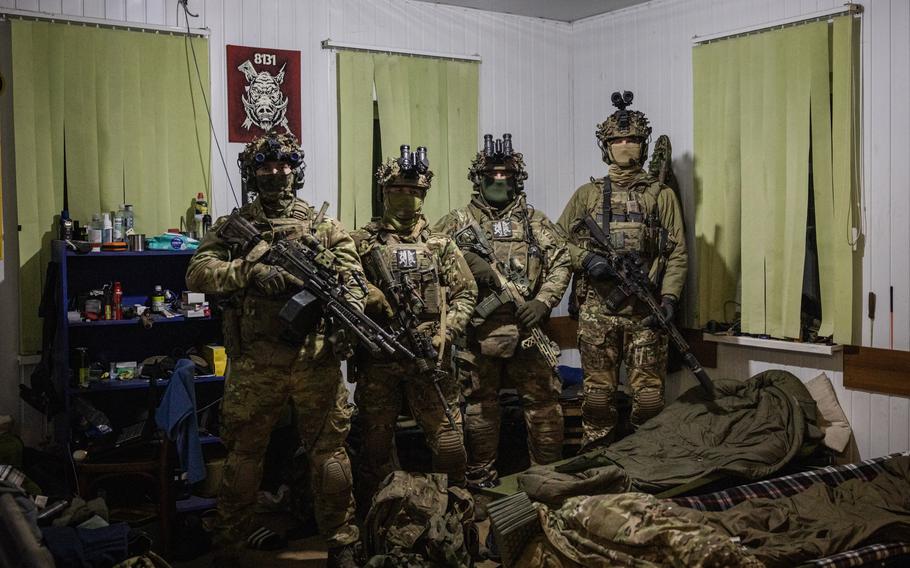
Soldiers (from left to right) Dmytro, Volodymyr, Vitalii and Viktor from Ukraine’s 8th Special Operations Forces Regiment, 1st Battalion, stand in their base on Wednesday in the Sumy region of Ukraine. (Ed Ram for The Washington Post)
Once inside, Dmytro, 24, quickly made visual contact with North Korean troops just 20 meters away, and fired.
For the next eight hours, he said, the North Koreans — dressed in white camouflage to blend in with the snow — did not stop firing back. The Ukrainians could hear one distinct voice giving orders in Korean, his tone occasionally growing more desperate, they said. They only once heard a Russian voice, yelling “Stop! Don’t go!”
The North Korean troops, who had previously taken other Ukrainian positions in Kursk, appeared surprised by the resistance from the nine Ukrainian special forces troops and four infantrymen at the position, soldiers who participated in the battle said. But the North Koreans also fought fiercely and aggressively, demonstrating advanced war tactics.
Ukrainian soldiers Vitalii and Volodymyr, 35, eventually identified one soldier they believed they could capture. They shot and wounded him, then Vitalii dragged him to the Ukrainian position, where a medic stabilized him. For four hours, they kept him alive, hoping he would be their first North Korean prisoner of war.
But as the Ukrainians retreated later that day, the North Koreans attacked again. In the course of a chaotic withdrawal under drones, artillery shells and gunfire, their prisoner and one of the Ukrainian soldiers were killed. Washington Post reporters viewed images of the body, which the troops examined and passed on to Ukrainian authorities.
The body intrigued local and foreign officials, the troops said, adding that both British and South Korean officials swabbed the body for DNA evidence of North Korea’s presence on the battlefield.
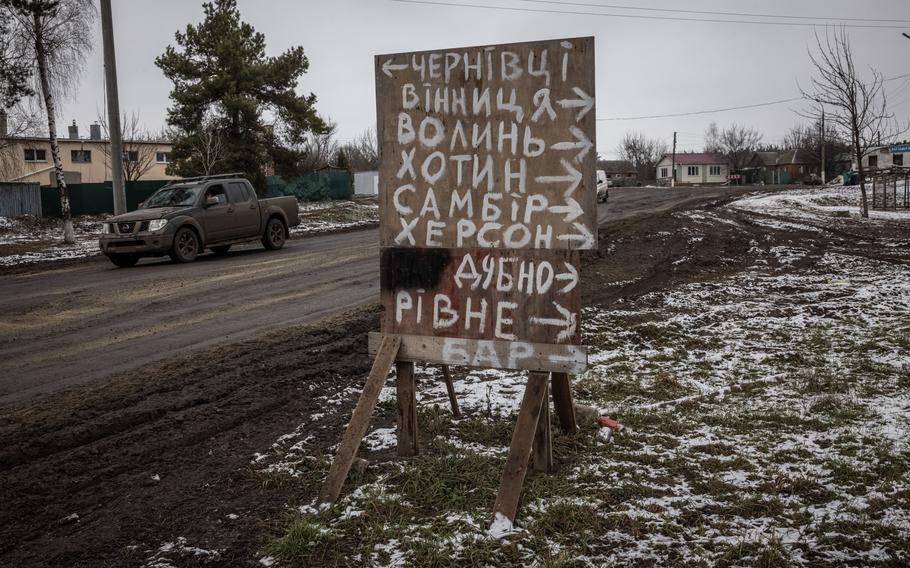
A sign showing incorrect directions to Ukrainian towns and cities on the road leading to Ukraine’s border with Russia on Wednesday in the Sumy region of Ukraine. (Ed Ram for The Washington Post)
Their group has not directly encountered North Korean troops since, but said they can see already how they are “adapting” to the battlefield, said Viktor, 30, commander of the special forces group that participated in that battle.
“They are trying to get smarter, they’re not trying to be at one point like a herd of sheep,” Viktor said.
Amed Khan, an American philanthropist who directly supports Ukrainian special forces units, showed The Washington Post a separate cache of North Korean documents he said Ukrainian troops had seized in Kursk, which he later had translated.
The Post could not independently verify the authenticity of the documents but they appeared consistent with other North Korean materials reviewed by The Post and the descriptions of battles aligned with independent Ukrainian descriptions of North Korean behavior on the front.
The documents, which were typed in Korean, suggest that North Korean troops are recording their combat experiences in detail and appear to be using the battlefield experience to gain a better understanding of new technologies. Ukraine has warned that Pyongyang is seizing the opportunity as a chance to gain practical battlefield experience for potential future conflicts with the West.
As Viktor suggested, they also appear to be learning from their mistakes.
“In modern warfare, where real-time reconnaissance and drone strikes are conducted, failing to disperse combat teams into smaller units of two to three members could lead to significant casualties from enemy drones and artillery,” one document read.
The documents also critically described the behavior of some North Korean troops, saying they killed some Ukrainian troops who attempted to surrender, a tactic that appeared to anger Ukrainians and ultimately “prolonged the battle.” Some North Korean troops, the documents said, repeatedly rushed to rescue their fellow wounded soldiers despite the risks of enemy attacks, causing further casualties.
One document said some North Korean troops struggled because they had not been provided “with crucial details such as enemy strongholds, drone launch sites, or artillery positions, and thus entered the battlefield unprepared.”
Khan said he hopes Trump will press for Pyongyang to back out of the war, and “explain to everyone that it’s in nobody’s interest … [for North Korean troops] to be getting killed seven time zones away from home on the border of Ukraine.”
Andrew Jeong and So Jin Jung in Seoul, South Korea, contributed to this report.
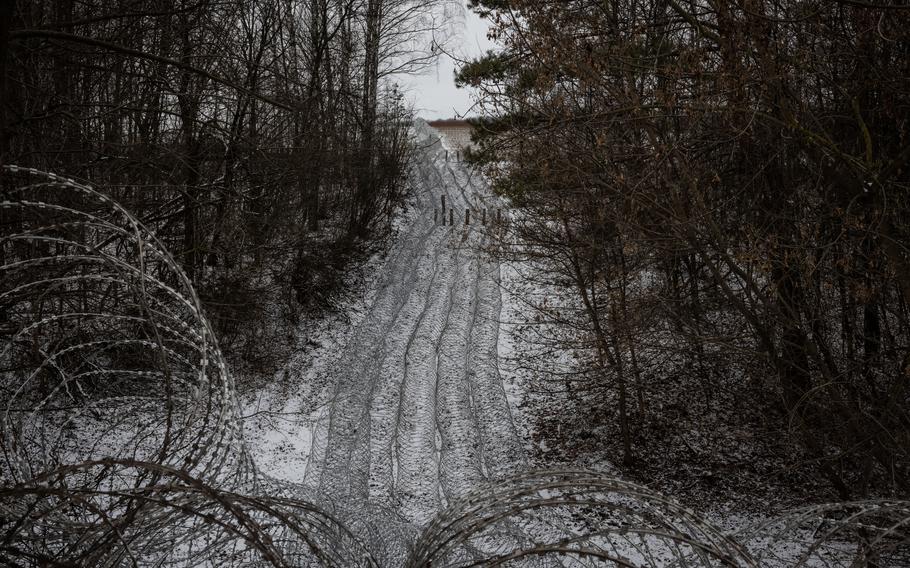
Rolls of razor wire are seen on the road leading to Ukraine’s border crossing with Ukrainian-controlled Russia on Wednesday in the Sumy region of Ukraine. (Ed Ram for The Washington Post)